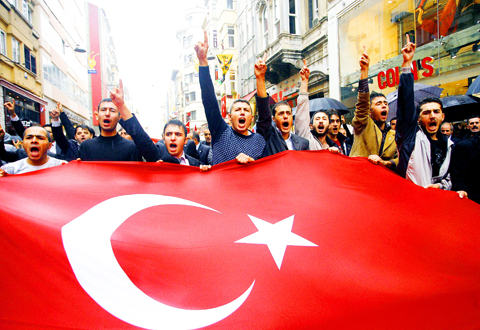Turkish warplanes have bombed Kurdish rebel bases in northern Iraq, the military said, just days after rebels killed 15 soldiers in an attack staged partly from Iraqi soil.
The planes on Saturday bombed rebel hideouts in Iraq’s Avasin Basyan region and returned safely to their bases, the military said.
The military’s deputy chief, meanwhile, accused leaders in northern Iraq of tolerating the rebels.

PHOTO: AP
“We don’t receive any kind of support from the local administration in the northern part of Iraq,” Turkish General Hasan Igsiz said on Sunday. “Our expectation from them is to accept that the terrorist organization is a terrorist organization and eliminate the support provided to it.”
Turkey is urging Iraqi Kurdish leaders to arrest the rebels and cut their supply lines, after rebels on Friday fired mortars and artillery from Iraqi soil onto a military outpost in a Turkish valley in Aktutun. The attack touched off the deadliest battle between Turkish troops and Kurdish rebels in eight months. Fifteen soldiers and at least 23 insurgents were killed, while another 20 soldiers were wounded and two were still missing, the military said.
“They did not die in vain, they did their duties and they succeeded,” Igsiz said.
The Turkish general also said northern Iraqi leaders should block the rebels from using local roads and hospitals.
The Turkish military says it needs Iraqi help to halt the rebel infiltration from bases across the long and mountainous border. It says its surveillance capabilities in Iraq are limited and that the rugged terrain made it difficult to defend positions.
Iraq’s national government has pledged to cooperate with Turkey.
Iraqi President Jalal Talabani — who is a Kurd — told Turkish counterpart Abdullah Gul in a phone call Saturday that he condemned Friday’s attack. He said the “ugliness” of the attack was increased by the fact that it was staged during the Muslim holiday of Id al-Fitr, marking the end of the fasting month of Ramadan.
Turkey’s civilian leaders have vowed to respond firmly to the rebels from the Kurdistan Workers’ Party, or PKK, which has been fighting for autonomy in the southeast since 1984.
But on the streets of Turkey, anger has mounted with each funeral held for the slain soldiers.
Public anger has turned toward Turkish leaders as well. On Sunday, mourners booed Gul at a funeral in the western city of Eskisehir and they booed Turkish Prime Minister Recep Tayyip Erdogan at a funeral in Armutlu village.
“If there is a government, it should show itself,” said 68-year-old Molla Atagur in Armutlu, calling for tougher action against the rebels.
The surge in violence followed relative calm since February, when Turkey staged a weeklong ground offensive against guerrillas based in northern Iraq.

A string of rape and assault allegations against the son of Norway’s future queen have plunged the royal family into its “biggest scandal” ever, wrapping up an annus horribilis for the monarchy. The legal troubles surrounding Marius Borg Hoiby, the 27-year-old son born of a relationship before Norwegian Crown Princess Mette-Marit’s marriage to Norwegian Crown Prince Haakon, have dominated the Scandinavian country’s headlines since August. The tall strapping blond with a “bad boy” look — often photographed in tuxedos, slicked back hair, earrings and tattoos — was arrested in Oslo on Aug. 4 suspected of assaulting his girlfriend the previous night. A photograph

The US deployed a reconnaissance aircraft while Japan and the Philippines sent navy ships in a joint patrol in the disputed South China Sea yesterday, two days after the allied forces condemned actions by China Coast Guard vessels against Philippine patrol ships. The US Indo-Pacific Command said the joint patrol was conducted in the Philippines’ exclusive economic zone by allies and partners to “uphold the right to freedom of navigation and overflight “ and “other lawful uses of the sea and international airspace.” Those phrases are used by the US, Japan and the Philippines to oppose China’s increasingly aggressive actions in the

‘GOOD POLITICS’: He is a ‘pragmatic radical’ and has moderated his rhetoric since the height of his radicalism in 2014, a lecturer in contemporary Islam said Abu Mohammed al-Jolani is the leader of the Islamist alliance that spearheaded an offensive that rebels say brought down Syrian President Bashar al-Assad and ended five decades of Baath Party rule in Syria. Al-Jolani heads Hayat Tahrir al-Sham (HTS), which is rooted in Syria’s branch of al-Qaeda. He is a former extremist who adopted a more moderate posture in order to achieve his goals. Yesterday, as the rebels entered Damascus, he ordered all military forces in the capital not to approach public institutions. Last week, he said the objective of his offensive, which saw city after city fall from government control, was to

‘KAMPAI’: It is said that people in Japan began brewing rice about 2,000 years ago, with a third-century Chinese chronicle describing the Japanese as fond of alcohol Traditional Japanese knowledge and skills used in the production of sake and shochu distilled spirits were approved on Wednesday for addition to UNESCO’s Intangible Cultural Heritage list, a committee of the UN cultural body said It is believed people in the archipelago began brewing rice in a simple way about two millennia ago, with a third-century Chinese chronicle describing the Japanese as fond of alcohol. By about 1000 AD, the imperial palace had a department to supervise the manufacturing of sake and its use in rituals, the Japan Sake and Shochu Makers Association said. The multi-staged brewing techniques still used today are